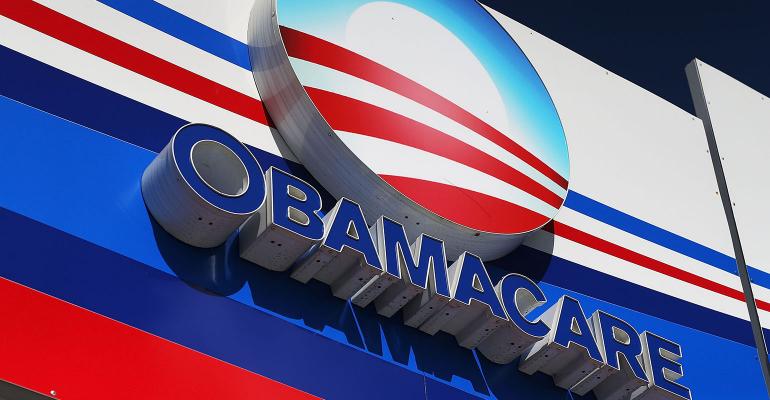By David Randall
NEW YORK, Jan 24 (Reuters) - Some prominent U.S. fund managers are betting that former President Barack Obama's signature healthcare law will not undergo the widespread changes that President Donald Trump promised on the campaign trail.
Portfolio managers from Fidelity, Gamco, Thornburg and other large firms say they see the broad outlines of the Affordable Care Act - commonly known as Obamacare - remaining intact despite Trump's signing of an executive order on Friday, his first day in office, that sought to weaken it.
As a result, these fund managers say they are buying shares of hospitals, health insurance companies and biotech firms they see as unfairly hit by political uncertainty.
"They may do enough to try to rebrand it as Trumpcare, but I just don't think it will be that dramatically different from what we have today," said Jeff Jonas, a portfolio manager at Gamco Investors in Rye, New York, who said he has been adding to his position in hospital and nursing center company Kindred Healthcare Inc and large health insurance companies.
"The executive order itself was very vague, and it's a little hard to say at this point what actual effect it will have," he said.
Trump's order directs government departments to "waive, defer, grant exemptions from, or delay the implementation" of provisions of the law that imposed fiscal burdens on states, companies or individuals, but provides no details.
HOSPITAL STOCKS GAINING
Investors overall still look hesitant to buy healthcare stocks, with fund flows to the iShares US Healthcare ETF , a widely held exchange traded fund that tracks the healthcare industry, falling 4.8 percent in the week ending Jan. 11, according to Lipper data.
Healthcare stocks fell swiftly after Trump was elected on Nov. 8, and have underperformed since. The S&P 500 healthcare sector has gained 2 percent since Election Day, compared with a 6.3 percent rise in the S&P 500 over the same time.
But hospital stocks such as HCA Holdings Inc have outperformed since the start of January on signs that Republicans plan to replace the Affordable Care Act at the same time they repeal it. Shares of HCA are up 7.9 percent since the start of the year, compared with a 1.2 percent gain in the S&P 500, and are trading slightly higher than they were on Election Day.
Although repealing the law requires only a majority in the Senate, replacing it would require at least 60 votes in the Senate, meaning that Republicans would have to win some Democratic support. As a result, fund managers said they expect only incremental changes.
A repeal without a replacement could put pressure on hospitals by rescinding the Medicaid expansion and individual subsidies, prompting more individuals to go without insurance and be unable to pay their hospital bills.
Representative Tom Price, Trump's nominee for health secretary, said in a hearing Wednesday that the administration will initially focus on individual health plans sold on exchanges and is not interested in "pulling the rug out on anybody," though he said it would also focus on Medicaid.
Some Republicans in Congress have been pushing for an outright repeal in order to give states more control of their healthcare programs. The House and Senate passed resolutions to have draft legislation that would repeal the law ready by Jan. 27. Other Republican senators have proposed that states have the option remain in the Obamacare insurance program.
NOT "A WHOLE LOT OF DISRUPTION"
Eddie Yoon, portfolio manager of the $6.1 billion Fidelity Select Heath Care fund in Boston, has not changed his holdings since the election because he does not see large changes coming.
He said he remains bullish on the medical device and biotech industries because both do not look like they would be significantly affected by any of the Republican healthcare proposals. He expects the moratorium on a tax on medical device sales, due to expire at the end of 2017, will be extended, and that controls on drug prices floated by Trump are unlikely to be enacted.
"I don't think the new administration wants to get bogged down in healthcare and they want to move on to immigration and tax reform and bigger policy items," said Yoon. "I don't anticipate that there will be a whole lot of disruption."
Biotech may also benefit if Congress passes legislation that cuts the taxes companies pay on profits earned overseas, leaving pharmaceutical companies flush and ushering in a wave of mergers and acquisitions, he said.
The Nasdaq Biotechnlogy Index is up 3.8 percent since the beginning of the year after falling more than 20 percent last year.
Connor Browne, a portfolio manager with the $889 million Thornburg Value fund in Santa Fe, New Mexico, said he added a position in biotech company Seattle Genetics Inc in late December. He also has been adding to his position in medical device makers in anticipation that little will be done to change the law, meaning that millions of Americans will still have insurance that will help pay for devices.
"While it hasn't so far paid to underestimate Donald Trump, it sure seems like we might be seeing indications that he doesn't understand how hard it will be to get legislation done," Browne said.
(Reporting by David Randall; Editing by Leslie Adler)





